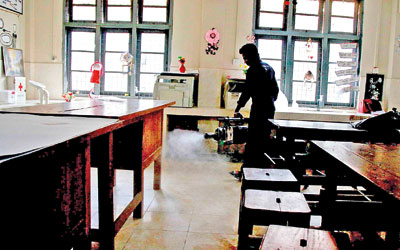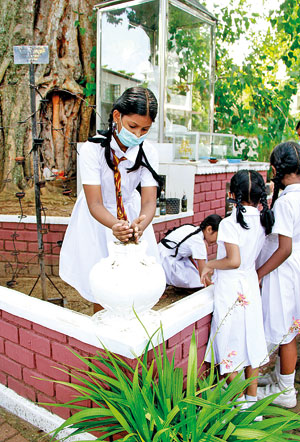News
The rise of dengue: Public need to keep environment clean

Fumigation and other cleaning being carried out at Viharamahadevi Balika, Colombo. Pix by Indika Handuwala
Nearly 36,000 dengue cases have been reported islandwide until June 30. The data available is collected from in – ward patients.
“The true numbers may be higher because there are undiagnosed patients,” Dr Anoja Dheerasinghe, Consultant Community Physician of the National Dengue Control Unit (NDCU) of the Ministry of Health said.
A shocking 11, 218 cases were reported for June alone.
on July 1, 396 patients were diagnosed. According to Dr Dheerasinghe more than 2000 patients were identified weekly in June. More than 50 percent of the cases were from the Western Province with the highest percentage from Colombo followed by Gampaha and Kalutara. Meanwhile Kandy, Galle, Kegalle, Kurunegala and Ratnapura have also been identified as high-risk areas. 
The NDCU has observed that most people who get admitted for treatment, arrive in the later stages of the virus. “It is imperative that treatment is sought during the early stages as it can lead to complications if not,” she emphasised. There is a risk of mortality associated with dengue which is rare in other viruses. Thirty deaths have been recorded so far.
It was crucial to go to hospital or see a General Practitioner 24 hours after contracting fever.
According to an entomological survey by the NDCU, schools, places of worship, construction sites, households and offices have been identified as places with higher risks of mosquito breeding. As many of these places are closed due to prevailing crisis, proper inspection has not taken place.
Dr Dheerasinghe believes that Health and Safety Officers must be appointed in workplaces and principals, religious leaders and relevant authorities must be alert about breeding sites. “Everyone should be involved in destroying these sites.”
When asked about necessary stocks of medicine Dr Dheerasinghe said for the time being there is sufficient medicines. However, if the case load continues to increase it will become a huge issue. A Full Blood Count (FBC) is the test done to monitor the platelet count of dengue patients. If the platelets are extremely low 2 FBC tests have to be conducted.
While requests have been sent to the Ministry of Health to procure larvicide, the present stock is sufficient for a few months. However, the main problem is the non compliance of citizens to health directives. “People have different priorities right now so their first thought isn’t keeping their environment clean, but it’s important that they do so to ensure that dengue doesn’t spread,” she warned.
Sri Lanka faced a dengue epidemic in 2017 with over 186,000 cases. Dengue prevalence was relatively less in 2020 and 2021 because of the restriction of movement owning to lockdowns due to the COVID-19 pandemic.
According to Dr Dheerasinghe, a lot of people frequently travel to the Western Province. When they get sick they go back to their towns or villages where mosquitoes bite them and spread dengue to the rest of the villagers, this is known as vertical transmission.
The best way to say that you found the home of your dreams is by finding it on Hitad.lk. We have listings for apartments for sale or rent in Sri Lanka, no matter what locale you're looking for! Whether you live in Colombo, Galle, Kandy, Matara, Jaffna and more - we've got them all!

